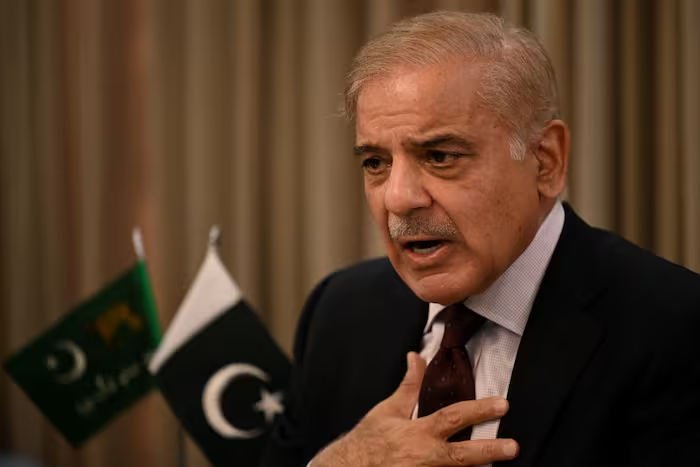New York/Islamabad, September 24, 2025 – Pakistan’s Prime Minister Shahbaz Sharif has once again stepped into the global spotlight, not for diplomatic achievements, but for his repeated pleas to the International Monetary Fund (IMF). With his country battling a dire economic crisis, Sharif on Wednesday appealed to IMF Managing Director Kristalina Georgieva to consider the recent devastation caused by floods before proceeding with its crucial program review scheduled for Thursday, September 25.
Speaking during the 80th session of the United Nations General Assembly (UNGA) in New York, Shahbaz Sharif highlighted Pakistan’s ongoing struggle to meet the IMF’s stringent bailout conditions. “We are continuously fulfilling our commitments with the IMF,” Sharif said, “but I urge the Fund to also take into account the massive economic damage inflicted by the recent floods.”
IMF Review Looms Large
The current $7 billion Extended Fund Facility (EFF) approved by the IMF in May 2025 is up for review this week. Thursday’s assessment will evaluate Pakistan’s economic performance between March and June 2025. A successful review is critical for Islamabad, as it would unlock the next $1 billion installment desperately needed to stabilize its dwindling reserves.
This is not the first time Pakistan has faced challenges in meeting IMF criteria. A second review conducted in August had already revealed Islamabad’s inability to achieve three crucial targets. According to the Finance Ministry, provincial governments collectively failed to meet the agreed savings of 1.2 trillion Pakistani rupees. Meanwhile, the country’s fiscal deficit ballooned to 6.2 trillion rupees, amounting to 5.4% of GDP—missing the IMF’s 5.9% deficit target.
Fifty Conditions and Counting
The IMF has laid down around 50 tough conditions for Pakistan under the bailout program, reviewed both quarterly and annually. The release of each installment is contingent upon Islamabad’s compliance. These conditions range from fiscal discipline and energy sector reforms to tax collections and subsidies.
Despite repeated failures, a report by Pakistan’s brokerage house Topline Securities recently claimed that the country is on track to fulfill all seven key quantitative performance criteria (QPC) for the upcoming review. However, critics argue that Islamabad’s track record tells a different story, one of unmet targets and shifting excuses.
Shahbaz Sharif Appeals for Sympathy
In his meeting with Georgieva, Shahbaz Sharif leaned on humanitarian grounds, urging the IMF to factor in the devastating impact of recent floods, which he claimed have severely disrupted Pakistan’s economy. According to the Prime Minister’s Office, the floods destroyed crops, displaced communities, and caused widespread infrastructure damage, further straining the fragile financial system.
A statement from Pakistan’s Information Department (PID) confirmed the request. “The Prime Minister highlighted the severe damage caused by recent floods and appealed to the IMF to incorporate this reality into their assessment,” the statement read. It also noted that Georgieva expressed condolences to those affected by the disaster.
A Familiar Pattern
For many observers, Sharif’s fresh appeal is nothing new. Over the years, successive governments in Islamabad have used natural disasters, security crises, and political instability as justifications for failing to meet IMF’s tough economic reforms. The cycle of borrowing, bailout packages, and repeated defaults has left Pakistan in a perpetual state of dependency on international lenders.
Critics argue that instead of genuine structural reforms—such as broadening the tax base, curbing corruption, and reducing reliance on imports—Pakistan’s leadership often falls back on emergency excuses to buy more time. The latest floods, while devastating, are seen by some as another chapter in the long narrative of evasion.
What’s Next for Pakistan?
The IMF’s Thursday review will be decisive. If Pakistan passes, it will unlock another tranche of desperately needed funds. Failure, however, could plunge the country further into financial instability, weakening investor confidence and depreciating the Pakistani rupee further.
For Shahbaz Sharif, the stakes could not be higher. His government’s credibility rests not just on international forums like the UNGA but also in the eyes of a frustrated Pakistani public dealing with rising inflation, energy shortages, and unemployment.
Whether the IMF accepts Pakistan’s flood-related plea remains to be seen, but one thing is clear: Shahbaz Sharif’s government is once again walking a tightrope, balancing between domestic survival and international financial scrutiny.
Also read – Whatsapp Now Lets You Translate Messages in Chats, Groups, and Channels: Here’s How It Works
